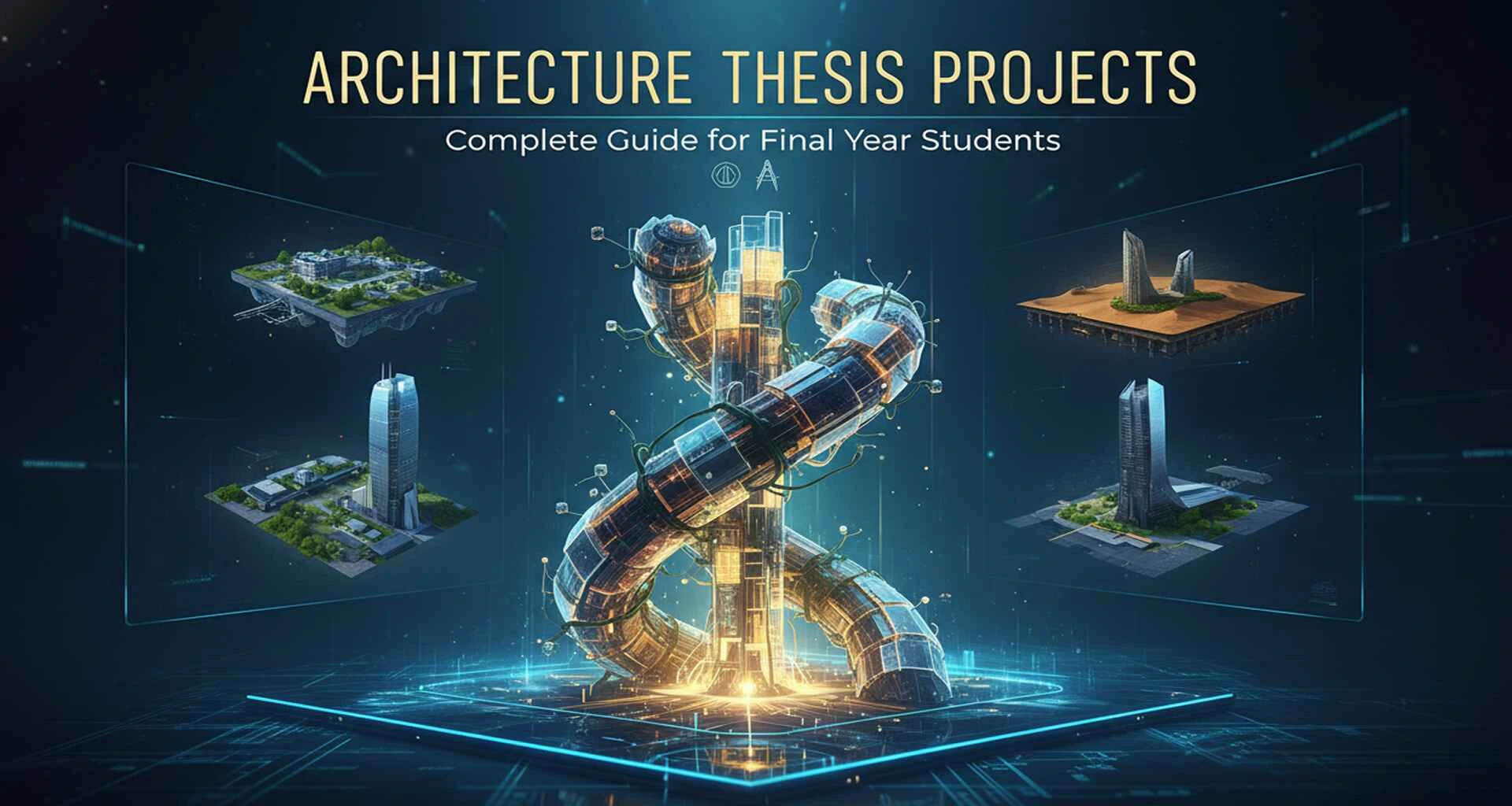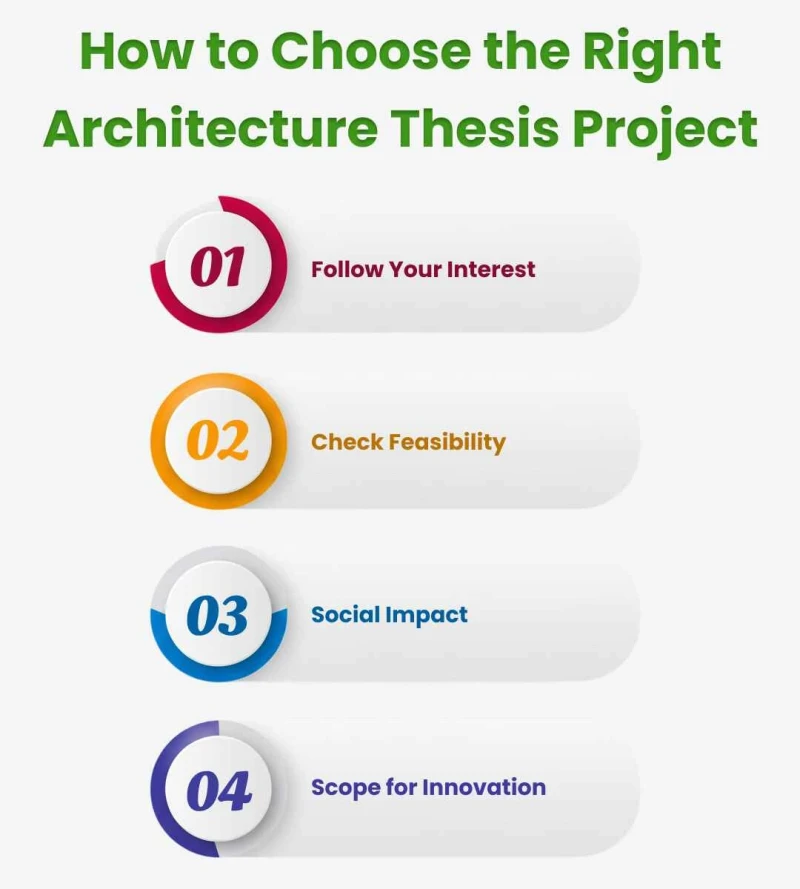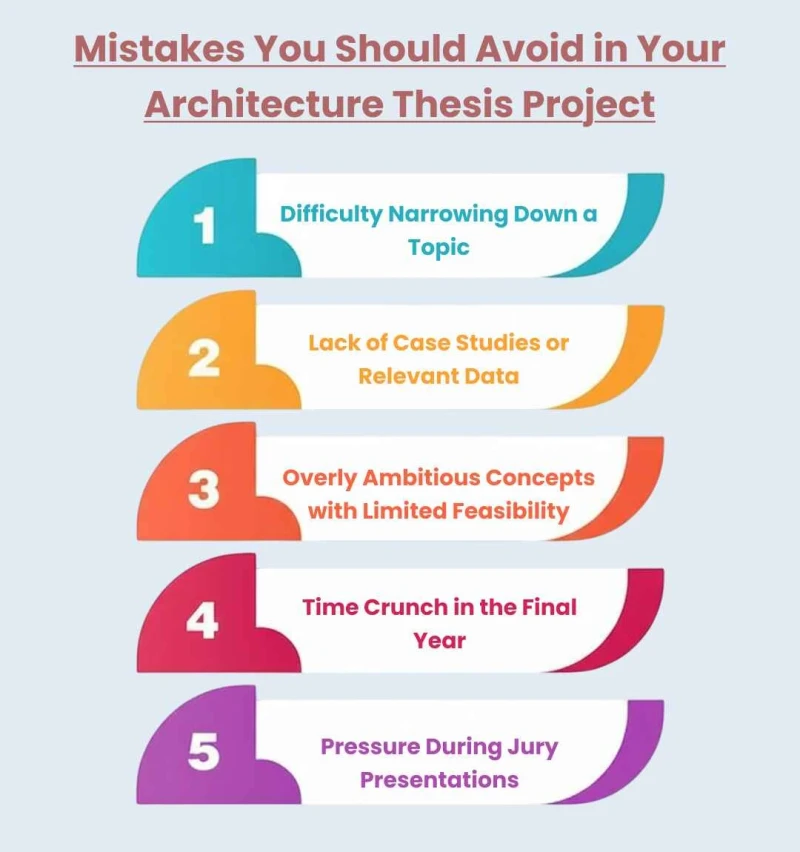Importance of Peer Review in Academic Publishing: Ensuring Research Quality and Credibility
Unlock the importance of peer review in academic publishing. Learn how to validate research, build credibility, and get your manuscript published faster

Esther F
You are in your last year in the architecture school- Congratulations. You have survived the all-nighters, endlessly tracing papers, and the classmate of yours who could use only organic forms. Your architecture thesis project is big now. It is not any other design entry, it is your architectural declaration. It demonstrates your resourcefulness, technical skills, and interest and it translates to the world what type of architect you are becoming.
This guide will include all information that will enable one to select a topic to the presentation of a good final jury presentation. Detailed guidance on planning and execution is available through our thesis writing service.
The thesis project on architecture is where it all ends. It is a research-based, full-fledged design project, that exhibits your understanding of design principles, construction, theory, and innovation.
It is not just about attracting schemes or drawing appealing fronts. It is designing a real life issue. Thesis is self-defined unlike studio projects, which are by definition based on a particular brief. You decide the issue, the location and the vision. It is your playground, and all your battlefield.
Consider it your personal self statement in its physical manifestation. All of your drawings, all your sketches, all of your lines all depict your design ethos and architectural self.

Selecting a thesis topic may seem like being at the threshold of a design universe that is infinitely large: Anything can be done, and not everything is doable. These steps will help to smartly reduce it.
Select something that you are passionate about. Months will be spent in research, design and refining. Passion is your best fuel. Now, when you are excited about sustainability, then get in there. When the idea of preservation of culture rings, do it.
Avoid overcommitment. Mars colonies are not what you are planning (unless they can be done). Evaluate the amount of information that you are able to collect, what you can reasonably design and the extent of research that you can deepen.
Thousands and thousands of people are served by architecture, not by buildings. Choose issues that address problems like housing issues in cities, socially responsive open areas or climate-sensitive buildings. Significant projects are distinctive.
Choose something to experiment with - new materials, adaptive reuse or hybrid typologies. Your thesis must test your abilities and stretch architectural allotment.
If you want your architecture thesis project to hit the sweet spot between innovation and relevance, here’s what’s trending:
Sustainable Architecture – Green buildings, energy-efficient design, biophilic spaces — this is the heart of modern design thinking.
Smart Cities – Tech-integrated urban planning, IoT in architecture, data-driven infrastructure. The future is wired.
Adaptive Reuse – Breathing new life into old structures; a sustainable, heritage-respecting approach.
Modular & Prefab Design – Fast, affordable, and flexible. A favorite for disaster relief or housing crises.
Parametric & AI-Driven Design – Using computation and AI to optimize and personalize architecture.
Climate-Responsive Architecture – Designs that adapt to environmental and geographic contexts.
Relevance: You're keeping in line with the world architectural discourse. Professors appreciate that.
Innovation: Popular topics challenge you to think outside the textbook, making your portfolio futuristic.
Employability: Companies look for architects who keep abreast of what matters now. Sustainability, digital design, and urban flexibility are trendy buzzwords.
Funding & Recognition: Most competitions and grants lean towards trend-inclined projects.
Let's call them what they are rookie traps:
Selecting a topic simply because it is a cool-sounding name. “Floating City on Mars” sounds great until you have to defend the plumbing.
Complexity for its own sake. Depth, not drama. Make it intelligent, not obtuse.
Ignoring site context. Your design needs to react to where it is constructed not just be aesthetically pleasing on paper.
Underestimating time and resources. Ambition’s great, but execution is everything. Plan your schedule, know your limits, and manage your energy.
Forgetting user experience. Architecture's not sculpture. People must live, work, and travel through it.
Your Architecture Thesis Project is not only a final-year requirement – it's your architecture manifesto. The sole project that screams to the world, "This is who I am as an architect." But between choosing a topic and getting through jury day, the process can seem like constructing a skyscraper with your bare hands.
So let's take it apart step by step from a blank page to standing ovation.
Before you start sketching, model-making, or pulling all-nighters, you need one thing to absolutely solidify your topic. It’s the foundation of your entire Architecture Thesis Project, and if that foundation is weak, everything else will wobble.
Choose a topic that genuinely interests you: Passion is contagious when you care about your project, it shows in every drawing and detail.
Ensure the topic is feasible: Ambition is great, but keep it realistic within your timeline, budget, and technical abilities.
Focus on social impact: Architecture should serve people create spaces that solve problems, not just win admiration.
Study current trends: Explore relevant themes like sustainability, adaptive reuse, smart cities, or climate-responsive design to stay aligned with the future.
Draft a clear problem statement: Identifying what issue you’re addressing and why it matters clarity early on saves you headaches later.
Set measurable objectives: Define what success looks like your thesis should have clear goals and outcomes.
Conduct literature reviews and precedent studies: Learn from past projects, understand what worked, and discover how you can push the idea further.
Now that your subject's established, it's time to ground it in reality. Your site is your painting, get to know it like your best friend.
Shortlist 2–3 potential sites; finalize one based on accessibility, relevance, and data availability.
Study the site context, analyze geography, climate, culture, demographics, and urban patterns to understand how your design fits into its surroundings.
Map environmental factors like sun paths, wind direction, noise zones, and circulation patterns to optimize comfort and sustainability.
Identify opportunities and constraints. Every site has strengths to leverage and challenges to solve and use both to shape your design narrative.
Research local regulations. Review building codes, zoning laws, heritage guidelines, and setback requirements before you dive into design.
Here's where your imagination comes in. This is where the fun (and slightly crazy) begins, where your thoughts start to coalesce.
Brainstorm 2–3 conceptual directions before finalizing one. Explore freely, sometimes the wildest idea sparks the most grounded design.
Develop zoning, circulation, and massing diagrams to translate abstract ideas into spatial logic.
Define your architectural philosophy and design narrative. What’s your story? What values drive your design choices?
Test your ideas through sketches, quick physical models, and digital massing studies — the faster you iterate, the clearer your vision becomes.
Iterate, refine, and seek feedback regularly. Great concepts are built on evolution, not perfection.
Once your concept is solid, it’s time to get technical and show how your dream actually works.
Develop architectural drawings: Prepare detailed plans, sections, and elevations that clearly communicate your design logic and spatial flow.
Create 3D visualizations and rendered perspectives: Use visuals to express mood, materiality, and experience to make the jury feel your space.
Build physical models: Showcase form, proportion, and spatial relationships through tangible, scaled models. Nothing beats the tactile clarity of a good model.
Include technical drawings: Integrate details on structure, materials, services, and sustainability systems to show your design’s feasibility.
Keep presentation sheets clean and consistent: Use a uniform layout, legible fonts, and logical sequencing clarity always outshines clutter.
Ah, the big finale when you present your project to the jury. Confidence, clarity, and storytelling are your strongest assets here.
Build a clear, logical flow: Start with the problem, then move to your concept, process, and final design. Every slide should feel like a natural continuation of your story.
Rehearse your pitch: Know your design like the back of your hand. Practice timing, tone, and transitions the jury can sense confidence instantly.
Think like a critic: Prepare for tough questions about feasibility, user experience, sustainability, and cost. If you can predict the attack, you can defend like a pro.
Refine your visuals: Make sure every board, render, and diagram communicates purpose. Clean layouts and readable text win over visual clutter every time.
Back up your design: Have your data, calculations, and references ready juries love proof.
Choosing the right Architecture Thesis Project category can define your entire design journey. From housing and heritage to sustainability, these curated themes and ideas will fuel your creativity and strengthen your vision.
Residential design is forever the essence of architecture. These subjects delve into community, affordability, versatility, and human comfort through creative solutions in housing that address the social and environmental conditions of today.
Urban design defines how people move, live, and connect. These topics explore future-ready cities, sustainability, and the digital transformation of urban environments.
Designing Resilient Coastal Cities in the Era of Climate Change
Smart Mobility Hubs for Next-Generation Transportation
Revitalizing Urban Waterfronts with Mixed-Use Development
Inclusive Urban Spaces for the Differently-Abled
Smart City Masterplan with IoT Integration
Reimagining Urban Public Spaces Post-Pandemic
Pedestrian-Oriented Urban Design for Compact Cities
Transit-Oriented Development in Expanding Metropolises
Vertical Urbanism: Building Cities Up, Not Out
Digital Twins for Smarter Urban Management
Sustainable Urban Heat Island Mitigation Strategies
Urban Agriculture as an Architectural Intervention
Revitalization of Old Industrial Districts
Flood-Resilient Urban Infrastructure Design
Circular Urban Systems: Waste to Resource Design
Smart Housing Neighborhoods with Energy Sharing Networks
Urban Design for Wellbeing and Mental Health
Sustainable Mobility Corridors for Eco-Cities
Urban Commons: Shared Spaces for Collective Growth
15-Minute Cities: Redesigning for Local Living
Urban Rewilding and Green Corridors for Biodiversity
Commercial and mixed-use projects balance economics, experience, and aesthetics. These topics dive into how architecture can support dynamic human interaction, innovation, and sustainability in high-energy environments.
Sustainable Business Parks for the Future Workforce
Smart Mixed-Use Developments with Integrated Energy Systems
Co-Working Spaces for Post-Pandemic Work Culture
Urban Retail Centers with Biophilic Design Elements
Revitalizing Traditional Marketplaces with Modern Infrastructure
Adaptive Reuse of Warehouses into Creative Hubs
Transit-Integrated Commercial Complexes
Vertical Mixed-Use Skyscrapers with Public Access Zones
Circular Economy Malls Promoting Sustainable Consumption
Experience-Driven Retail Architecture
Community Markets Promoting Local Economy and Culture
Smart Shopping Districts Using AI-Based Analytics
Commercial Spaces Powered by Renewable Energy
Climate-Responsive Office Buildings
Co-Living and Co-Working Hybrids for Digital Nomads
Waterfront Business Districts
Sustainable Corporate Campuses with Net-Zero Energy
Multi-Level Urban Retail with Public Greens
Urban Food Hubs Integrating Agriculture and Retail
Regenerative Mixed-Use Urban Ecosystems
Post-Carbon Commercial Districts
Preserving the past while designing for the future that’s the challenge of heritage-driven design. These topics explore adaptive reuse, cultural identity, and architectural storytelling.
Adaptive Reuse of Historic Industrial Sites
Digital Reconstruction of Lost Heritage Structures
Cultural Centers Reviving Indigenous Art Forms
Sustainable Restoration of Colonial Architecture
Museum Design Celebrating Local History and Memory
Integrating Modern Architecture in Heritage Precincts
Urban Heritage Walk Design for Historical Cores
Revitalizing Forgotten Monuments through Design Interventions
Community-Led Conservation of Historic Towns
Craft Villages as Living Heritage Museums
Conservation Strategies for Vernacular Settlements
Designing with Local Craft Techniques
Cultural Hubs for Art, Music, and Performance
Reinterpreting Traditional Courtyard Architecture
Preservation of War Memorial Architecture
Digital Heritage Archives and Interactive Exhibitions
Revival of Sacred Architecture in Modern Contexts
Regeneration of Historic Waterfronts
Heritage Adaptive Reuse for Tourism Development
Sustainable Urban Heritage Corridors
Hybrid Heritage Centers Merging Old and New
These projects shape minds, nurture communities, and inspire growth. From schools to innovation hubs, these topics emphasize functionality, flexibility, and holistic learning environments.
Future-Ready Smart University Campuses
Sustainable Design for Rural Schools
Inclusive Learning Environments for Special Needs Education
Community Learning Centers in Urban Slums
Architecture Schools as Living Laboratories
STEM-Focused Educational Campuses
Modular School Design for Rapid Deployment
Eco-Friendly Preschool Design
Open-Air Learning Environments for Tropical Climates
Vocational Institutes Promoting Local Crafts
Digital Learning Centers for Remote Communities
Educational Spaces in Post-Conflict Zones
Student Housing Integrated with Learning Spaces
Experiential Learning Campuses for Architecture Students
Research and Innovation Parks
Libraries as Community Anchors
Sustainable University Masterplans
Design for Education in Climate-Resilient Regions
Schools Integrated with Urban Public Spaces
Hybrid Online-Offline Learning Environments
Regenerative Campuses Powered by Renewable Energy
Landscape architecture bridges nature and the built environment. These topics explore sustainability, ecological restoration, and the poetry of outdoor space.
Climate-Resilient Urban Parks
Wetland Restoration and Ecological Corridors
Vertical Green Infrastructure for High-Density Cities
Rewilding Urban Landscapes
Riverfront Redevelopment for Sustainable Tourism
Healing Gardens for Hospitals and Wellness Centers
Community Urban Farms and Food Forests
Coastal Protection through Landscape Design
Water-Sensitive Urban Design Strategies
Landfill-to-Park Transformations
Landscape Design for Climate Adaptation
Biodiversity Parks for Endangered Species
Green Roof Systems in Dense Urban Areas
Urban Forests for Air Quality Improvement
Low-Impact Recreational Landscapes
Eco-Resort Design in Sensitive Ecosystems
Nature-Based Flood Management Parks
Educational Botanical Gardens
Restorative Landscapes for Mental Health
Carbon-Neutral Urban Greenbelts
Landscape Design for Renewable Energy Fields

All architecture students hope for the perfect thesis but even the most brilliant ideas can fall apart under bad planning or over-reach. Here's your wake-up call: the most common mistakes that can ruin your Architecture Thesis Project, and how to avoid them like a pro.
You can't solve everything anywhere at once. Be specific. A well-defined, concentrated subject provides your project with direction and depth. Vague themes water down your design intention clarity trumps every time.
Holding back on research is like drawing without tracing paper; you'll lose direction quickly. Good case studies bring your concepts down to earth and allow you to defend design decisions.
Dream big, sure but don't submit a flying green city if you can't design the roof. Feasibility is king. The jury adores innovation, but only when supported by reason and constructibility.
The old trap. Procrastination is the quiet murderer of good architecture. These timelines always contract more quickly than you imagine and panic never results in good design.
Your design may be exceptional, but without a confident, clear presentation, it won’t stand out. Storytelling and delivery are as vital as your drawings, models, and thesis format.
Your Architecture Thesis Project is the big finale — the moment when all the years of studying finally come to life. To ensure that you make it shine, we have some golden rules here to distinguish the good from the great.
Don't wait until inspiration hits at the eleventh hour. Establish deadlines for research, design development, and presentation boards and be adherent to them. Discipline is design's best pal.
Your thesis should make a difference. Select a project that seeks to solve social, environmental, or urban problems — something that makes a real impact outside the studio.
Don't go it alone. Ongoing feedback fuels robust design thinking. Seek mentorship and subject-matter expertise in thesis writing; it'll prevent blind spots and burnout.
Technology fuels creativity, but sketching refines instinct. Leverage digital precision with the raw intensity of hand-drawn sketches to convey your vision in a true light.
Good designs don't speak, they narrate. Organize your story well: What is the issue? What is your idea? How does your design address it? Make your images talk, but let your words conquer hearts.
Your Architecture Thesis Project isn’t in reality an academic submission — it’s the cornerstone of your specialist identity. Treat it as a portfolio masterpiece that showcases your creativity, technical prowess, and structure philosophy.
And remember, you don’t have to navigate this day trip alone. If you ever prefer an increased hand even as developing your project, our expert support is proper right here to help guide you by means of every and each sketch challenge, draft, and presentation.
Every legendary architect commenced with a single thought and the braveness to supply it to life. Believe in your imagination and prescient the world is organized to see it rise.
Unlock the importance of peer review in academic publishing. Learn how to validate research, build credibility, and get your manuscript published faster
Master the top methods of primary data collection in research methodology. Learn to use surveys, interviews, and experiments to gather original, high-quality data.
Don’t write your methodology without reading this. Learn why purposive sampling is essential for case studies and how to define your inclusion criteria. Url:purposive-sampling
Master the chapterization of thesis to ensure logical flow. Learn the standard academic framework for organizing research into a professional, approved document.
A practical guide to sentiment analysis research papers covering methodologies, datasets, evaluation metrics, research gaps, and publication strategies.
Master data analysis for research papers. Learn quantitative and qualitative methods, cleaning, and reporting standards to ensure your study meets journal rigour.